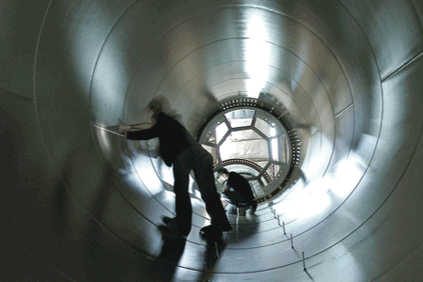The DoC will also probe whether China is subsidising its tower companies so they have an unfair advantage when exporting to the US. The probes, announced last month, followed a complaint in late December by the US-based Wind Tower Trade Coalition.
The coalition has asked for duties of around 60% on the Asian towers. Its members include Broadwind Energy, DMI Industries, Katana Summit and Trinity Structural Towers. The US has previously slapped anti-dumping duties on imported products in 280 cases.
The spat highlights a fundamental but quiet shift in the US supply chain, especially for the vast projects under way on the US west coast, where transport costs from Asia are lower. Imported towers from China and Vietnam roughly doubled in the first nine months of 2011, compared with the same period a year earlier, when measured by weight, according to the complaint. In 2010, US imports of towers from China were priced at $103.6 million while imports of Vietnamese towers were $51.9 million.
Chinese towers are being used in Caithness Energy’s 845MW Shepherds Flat project in Oregon, the world’s largest onshore wind farm, according to Kerry Cole, president of Trinity Structural Towers of Texas, at a January hearing of the International Trade Commission (ITC), which is also considering the case. Caithness Energy could not be reached for comment.
A spokeswoman for GE, supplier of the Shepherds Flat turbines, would not confirm or deny the origin of the towers. but said: "GE is using our global supplier network to deliver this project in the most cost -effective manner for the customer."
Jesse Broehl, an adviser at Make Consulting, estimates around one third of the towers now used in the US are imported. Of those, about two thirds are from Asia and the rest are Canadian. According to the DoC, China’s tower makers allegedly undercut US tower prices by 213%, while Vietnamese companies charged about 142% less. Labour costs in China and Vietnam are far lower than in the US, noted Broehl, while plate steel is somewhat cheaper. The steel industry in China is state-owned.
According to the complaint, in a "highly representative" case, Titan Wind Energy (Suzhou) of China offered a 168-tonne tower to a US client for about $291,000. Similarly, CS Wind of Vietnam offered a 172-tonne tower in the US for $333,000.
CS Wind, which supplies a high volume of towers to Siemens and Vestas, accounts for nearly 65% of imported Asian turbines, said Broehl. A New York-based lawyer for the Chinese and Vietnamese companies cited in the case could not be reached for comment.
Price is not the only issue. At the ITC hearing, Christopher Hauer, director of Siemens’ US tower operations, reportedly said: "Domestic manufacturers have proved themselves unreliable and often unwilling to provide supply. Siemens cannot afford to be left without supply alternatives."
The ITC’s preliminary judgment will be issued by mid-February. Separately, after six months the DoC will decide preliminarily whether US tower companies have been harmed. It could then require Chinese and Vietnamese importers to make cash deposits in case duties are imposed. A final decision on duties is not expected for 12-13 months. Chinese solar panels are the subject of a similar probe at the DoC and ITC.
The view from China
The Chinese said the probe would harm co-operation with the US in renewable energy. But industry officials said it would have limited impact on the Chinese wind-tower sector.
Only four companies are exporting wind towers to the US, said Li Junfeng, deputy director of the energy research institute under China’s National Development and Reform Commission. Most tower companies are eyeing the Chinese market, he said.
But the investigation will force Chinese wind-tower makers to produce upgrades more quickly, said Shi. The Chinese wind turbine and component manufacturing sector has suffered from surplus production capacity. Once export to the US market is suffocated, Chinese wind-tower makers will be met with more fierce competition.
A senior official at the China Chamber of Commerce for Import and Export of Machinery and Electronic Products said Chinese firms export more wind towers to the US because they compete on advanced management, production technologies and scaled production, rather than low-price dumping or government subsidies.

.png)

.png)











